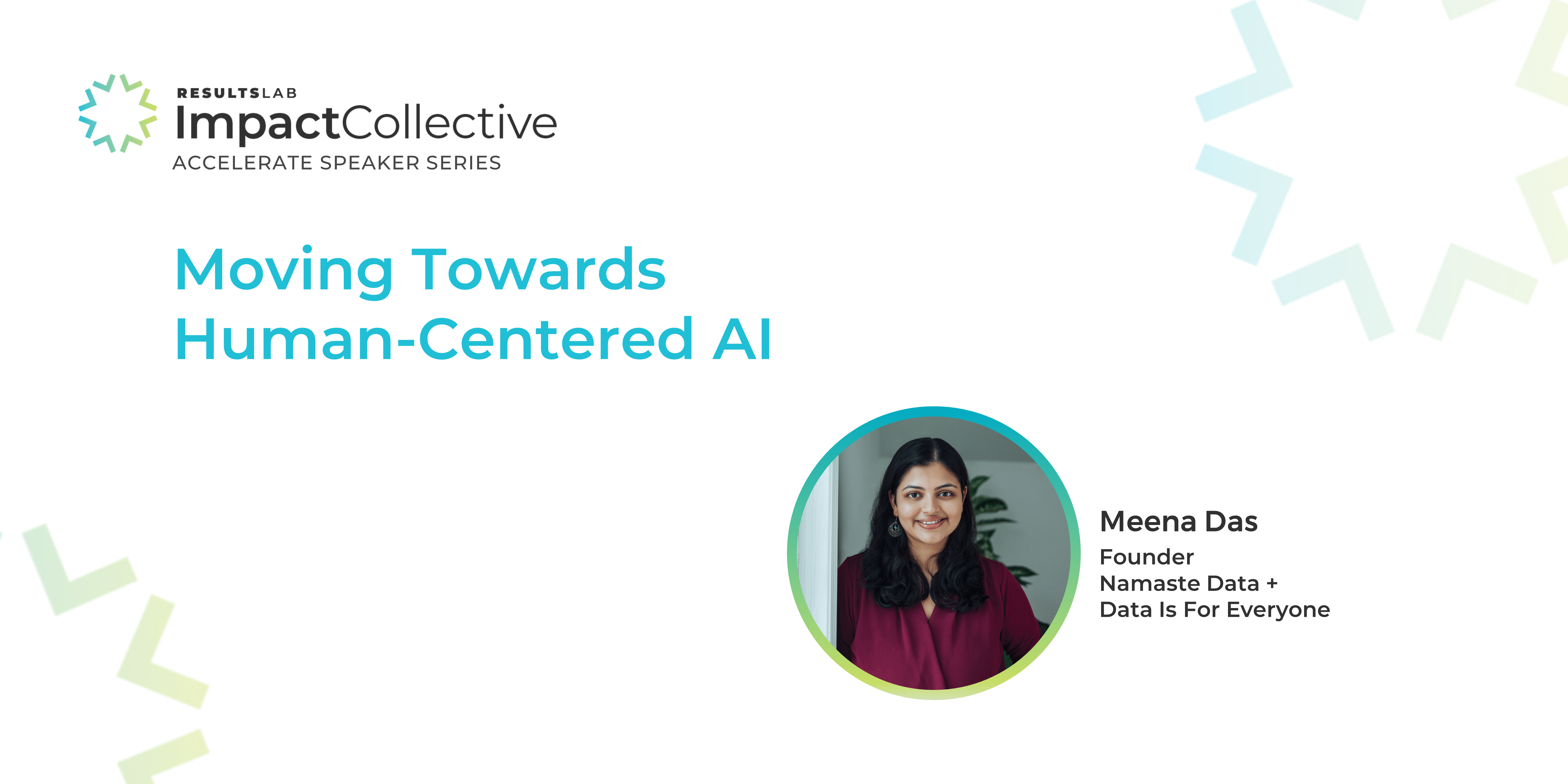Meena Das (she/her) is the founder, consultant, and facilitator of two practices – Namaste Data and Data Is For Everyone. Namaste Data focuses on advancing data equity for nonprofits and social impact agencies, while Data Is For Everyone provides invaluable tools and resources to help people learn how to navigate the world of data.
Meena is a specialist in designing and teaching equitable research tools and analyzing engagement. She supports nonprofits in three critical areas: data collection assessments, community surveys, and staff workshops on improving data equity, incorporating data collection, visualization, and human-centric algorithms.
You can learn more about her work through the bi-weekly newsletter, ‘Dear Human’, or directly connect with her on LinkedIn.
In this blog post, we share highlights from the webinar about how to approach AI in nonprofits from an equitable and conscious lens.
To watch a recording of the panel discussion, you must be a member of ResultsLab’s Impact Collective. You can join the community here, and if you’re already a member, see the full recording here.
From virtual assistants like Siri and Ok Google to translation services, e-commerce giants like Amazon, and the efficiency of Gmail and PayPal, AI plays a pivotal role – whether we realize it or not. Yet, it’s intriguing how relatively few take the time to discuss this revolutionary technology, and fewer still possess a comprehensive understanding of its workings as well as its implications for our work in the nonprofit and social good sectors.
Consciously Optimistic, Not Just Cautiously So:
Meena emphasizes shifting our perspective from being cautiously optimistic to consciously optimistic. Instead of merely hoping for the best, we should actively engage in shaping the future of AI. We should ask ourselves, “How can we do good with data every day?” This question should be at the forefront of our minds, driving us to consider the profound relationship between Diversity, Equity, and Inclusion (DEI) and data.
The Power to Make a Difference
Our role in shaping the future of AI is more significant than you might think – we have the power to influence the trajectory of AI towards a more human-centric approach through our own work. Nonprofits, for instance, are increasingly utilizing AI for enhancing major gift segmentation, donor engagement, task automation, volunteer coordination, and program delivery. Data, the foundational piece of AI, provides us with an opportunity to put humans at the center of this technological revolution, ensuring that it benefits all of humanity.
The Challenge: AI’s Dark Side
However, the journey towards human-centric AI is not without its challenges. AI has the potential to inadvertently sort and profile biased data, leading to exclusion, tokenism, and discrimination. The complexity, opacity, and proprietary nature of AI systems often mean we only realize something has gone wrong after a significant number of people have been affected. Moreover, there is a shortage of individuals with the skills and comfort needed to question and challenge these new automated and predictive systems.
Implementing AI with Purpose
So, how do we navigate this complex landscape? Here are some conversation starters for implementing AI with purpose and a focus on humanity:
- Listen to Community Needs: Whether it’s donors, staff members, or the broader community, listen to their needs and concerns. AI should address these real-life issues.
- Center Your “Why”: Always keep your purpose at the forefront. Understand why you’re bringing AI into the fold, and ensure it supports the goal of building human relationships.
- Create Inclusive Spaces: Promote diversity not only in terms of race and ethnicity but also in roles and perspectives. Ensure that AI genuinely benefits everyone.
- Establish Robust AI Governance: Avoid treating AI as just another app. Develop a clear purpose and intention behind its use. An evaluation framework can help guide your efforts.
- Understand Data: Gain a deep understanding of the data you’re working with. Who is represented in your data? Who is missing? This awareness is crucial, as it directly influences AI outcomes.
Defining Our Future
Ultimately, it’s essential to ask the big question: What kind of future do you want to live in? Pose this question repeatedly, as the answer will change over time. It’s through these ongoing reflections and discussions that we can collectively shape a future where AI truly serves humanity.
Taking Action Now:
To kickstart this journey, unpack these ideas with your team and for yourself. Consider your role in building trust with algorithms and how your team can leverage AI effectively and embrace the challenge to utilize AI to shape a better future for all.
Recommended Resources:
- Equity Guide for Nonprofit Technology – a guide to use as an active and regular part of your strategy discussions, policy review processes, and as a resource for evaluation
- Impact Collective (*must be a member to access these resources)
- *Webinar Recording
- *Building an Equitable World with the Tech That Comes Next – Accelerate Speaker Series, April 2023 featuring Amy Sample Ward, CEO of NTEN, and Afua Bruce, Principal at ANB Advisory Group.

